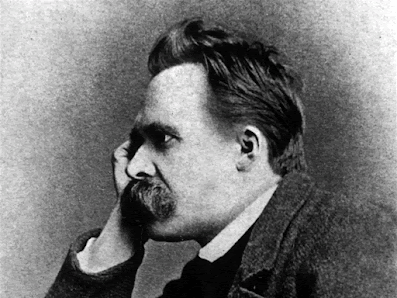January 28, 1912 [For His Son]
It may go without saying that the mad curmudgeon, Friedrich Nietzsche, would have loathed the "anti-natural morality" of the cinema, its restrictions, its condemnations—I am put in mind of William Blake's baleful garden-cum-churchyard with "Thou Shalt Not" written above the gate ("binding with briars" his "joys and desires")—and I must admit I too feel the call of this wild, the urge to join the Nietzschean "
affirmers," as he put it, "immoralists" who reject with outrage the crude curses of prigs. But the "moralists" of the cinema do have one trait in common with these Übermenschen: they both "philosophize with hammers." Rough work, but effective.The Good Doctor indulges his son—frees him from his restraints, as it were, by piling on his needy head every dollar he requests. And, as usual, such freedom must be paid for. The father rises to entrepreneurial heights with "Dopokoke," a refreshing beverage laced with cocaine. Naturally, it's a huge success—and the Dionysian mad ball begins: The doctor's secretary drinks, the son adds more cocaine, the brew turns poisonous as the wild-eyed dope-fiends revel and defile themselves.
Not exactly the vim, vigor and go promised by the makers of Coca-Cola, the "snappy drink."
Or perhaps so, but with a mis-strike of the Nietzschean hammer. Yes, we are all free—and of course History has with left-handed alchemy debased everything golden, from love to freedom. But love and freedom persist, no matter the admonishing grimaces of pseudo-moralists or the liberating dynamite of revolution. And the poet demands freedom even more loudly than (or with as much vim and vigor as) the Modern philosopher—or the middle-class son, demanding necks he can step on to peer over Morality's frowning wall. And make no doubt of it, heads must roll (well, necks (and hearts) must break) for such freedom to be bestowed. It's the inescapable physics of morality: One may curse the law, but that does not stop it from exacting its fee. Our actions occur cheek-to-cheek, so that my slightest smile or frown is felt in the muscles of your face—and my screams (should) burst your eardrums—as my joy should shock you into laughter.
No matter how much we may deny it, this law endures, so that even if I don't feel your tears on my face I must, some day, admit it's because I've grown numb, or have confused them with my own. And again: I may deny your beaming joy, but the effort is great, you stand so close, and I must squeeze shut my eyes and clamp my hands over my ears until the pain of the effort replaces the pleasure of sharing that joy. So mock on, Nietzsche—and wag your finger, dear Doctor-Father: We still live in a crowded space, and must shift to accommodate each other's bulk.



Comments
Post a Comment